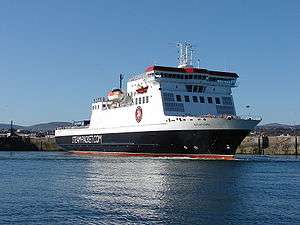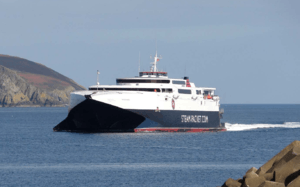SS Tynwald (1846)
Tynwald berthed at the Coffee Palace Berth, Douglas. | |
| History | |
|---|---|
| Name: | Tynwald |
| Namesake: | Tynwald |
| Owner: | 1846-1886: Isle of Man Steam Packet Company |
| Operator: | 1846-1886: Isle of Man Steam Packet Company |
| Port of registry: | Douglas, Isle of Man |
| Route: | Isle of Man to Liverpool |
| Builder: | Robert Napier and Sons |
| Cost: | £21,500[1] (equivalent to £1,910,723 in 2016).[2] |
| Yard number: | 19 |
| Way number: | 21921 |
| Launched: | 28 April 1846[1] |
| Completed: | 1846 |
| Out of service: | 1886 |
| Identification: |
|
| Fate: | Scrapped 1888 |
| Status: | Scrapped |
| General characteristics | |
| Type: | Paddle Steamer |
| Tonnage: | 700 gross register tons (GRT) |
| Length: | 188 ft (57 m) |
| Beam: | 27 ft (8.2 m) |
| Draught: | 13.5 ft (4.1 m) |
| Installed power: | 280 horsepower (210 kW) |
| Propulsion: | Oscillating steam engine |
| Speed: | 16 knots (18 mph)[3] |
| Capacity: | 781 passengers |
SS (RMS) Tynwald (I), No. 21921, was an iron paddle-steamer which served with the Isle of Man Steam Packet Company, and was the first vessel in the Company to bear the name.
History
The Isle of Man Steam Packet Company's first Tynwald was built by the Robert Napier and Sons of Glasgow, in 1846. She has the dubious distinction of being the first Steam Packet vessel whose launch was delayed by a strike in the shipbuilding yard[4] - as reported by the directors in 1846. The first, but by no means the last.
Tynwald was a reliable ship. A local newspaper described her as being 'as sure as a mountain goat'.[5]
The fastest ship of her day,[6] Tynwald recorded 16 knots (18 mph) on her sea trials.[6]
Upon her completion, she was taken under the command of the Commodore of the Line, Captain William Gill and made passage to Douglas in a time of 12hrs.[7]
The arrival of the Tynwald was celebrated in the Mona's Herald:-
"This magnificent steam ship arrived last night in Douglas Bay about a quarter to twelve o'clock, having made the passage from Greenock. A salute was fired from the Fort Ann Hotel, and a number of people were assembled on the pier, but the moonlight did not enable us to notice her proportions, farther than her rig. She will come into the harbour at an early hour this morning, and will sail to Dublin on a pleasure excursion with the shareholders and other friends exclusively, on Thursday night at 11 o'clock, and return on Friday evening at 8 o'clock."
— Mona's Herald. Wednesday, September 2, 1846.
On Thursday 31 December 1846, when on charter to the Liverpool and Belfast Company and under the command of Captain William Gill, she collided with the Admiralty Steam Vessel Urgent and damaged a paddle box. The collision occurred in the River Mersey, in the vicinity of the Formby Lightship.[9] Captain Gill was exonerated by the directors: the accident occurred in dense fog. It is noted in the Company minutes, that a provision of £386 (equivalent to £34,304 in 2016)[2] was to be set aside to meet repairs to the damage suffered by the vessel. This did not prevent the directors from later claiming £2,004 (equivalent to £178,097 in 2016)[2] in compensation for damage and loss of earnings, and then, on legal advice, settling for £1,489. On 22 February 1848, she collided with the brig William. One of the vessels lost her bowsprit, jib-boom and bulwarks.[10] In December 1863, she was in collision with the Naval brig Wild Wave, the settlement after a long wrangle costing the Steam Packet £1,128 (equivalent to £100,246 in 2016).[2]
Layout
Tynwald was rigged as a barquentine, with a clipper bow.[11] She had three masts, with the funnel abaft of the paddle boxes. A conspicuous feature was a full length figurehead of a Manx Scandinavian king in armour.
Service
Tynwald operated the passenger and cargo service between Liverpool and the Island of Man. After 1863, she was only used as cargo vessel.[11]
During the winter season in 1850, she was chartered to go to the Mediterranean and called at Gibraltar, Genoa and Leghorn, making the round trip in 30 days.
Disposal
After an eventful career of 40 years, she was sold to Caird & Company for £5,000 (equivalent to £499,851 in 2016)[2] in part payment for her successor, Tynwald (II).
Footnotes
- 1 2 "PS Tynwald". Shipping Times. Retrieved 8 February 2012.
- 1 2 3 4 5 UK Retail Price Index inflation figures are based on data from Clark, Gregory (2017). "The Annual RPI and Average Earnings for Britain, 1209 to Present (New Series)". MeasuringWorth. Retrieved 6 November 2017.
- ↑ "Ships of Mann: The Fleet". Archived from the original on 18 March 2012. Retrieved 8 February 2012.
- ↑ Connery Chappell - Island Lifeline, (1980) p18
- ↑ Connery Chappell - Island Lifeline (1980) p18.
- 1 2 Ships of the Isle of Man Steam Packet Company (Fred Henry) p.64
- ↑ Mona's Herald 2 Sep 1846
- ↑ Mona's Herald. Wednesday, 2 September 1846.
- ↑ The Manx Liberal. Saturday 2 January 1847
- ↑ "Ship News". The Belfast News-Letter (11436). Belfast. 25 February 1848.
- 1 2 "Tynwald". Ship Stamps. Retrieved 8 February 2012.
References
- Bibliography
- Chappell, Connery (1980). Island Lifeline T.Stephenson & Sons Ltd ISBN 0-901314-20-X

